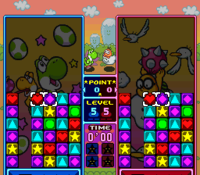Panel
- This article is about the objects in Tetris Attack. For other uses of the term "Panel", see Panel (disambiguation).
| Panel | |
|---|---|
| First appearance | Panel de Pon (1995) Tetris Attack (1996, Super Mario franchise) |
| Latest appearance | Animal Crossing: New Leaf - Welcome amiibo (Animal Crossing Puzzle League) (2016) |
Panels are multicolored square shapes that appear in Tetris Attack. They are the main puzzle-solving element of the game. They mainly come in green with a circle, purple with a diamond, red with a heart, yellow with a star, cyan with a triangle, and blue with an upside down triangle.
During gameplay, each player has their own playing field where a stack of panels rises from the bottom; if it reaches the top, that player has lost. To prevent that from happening, the player much match three alike panels either horizontally or vertically, which causes that row of panels to disappear from the stack. This is done using a rectangular cursor that can select and switch only two horizontally adjacent panels at a time. Panels are also affected by gravity and fall in gaps, allowing them to move vertically, but must be in place in order for the alignment to count.
It is also possible to attack opponents through the use of Shock Panels (gray with a white exclamation mark), Chains, or Combos. Shock Panels create Shock Blocks, Combos create short garbage blocks, and Chains create long garbage blocks, which litter the opponent's playing field. Chains are caused either by aligning four or more panels together or when panels sitting on top of a cleared row fall and are cleared themselves. Combos are caused when four or more panels are cleared simultaneously. The garbage blocks caused by these reactions cannot be moved or eliminated, and they rest at the top of the stack; however, clearing a row of panels touching the garbage block makes it transform into more panels, which in turn affect other garbage blocks of the same color that may be touching it. If the garbage block has thicker width due to large reactions, this requires action on each layer separately.
Names in other languages[edit]
| Language | Name | Meaning |
|---|---|---|
| Japanese | パネル Paneru |
Panel |
| Tetris Attack | ||
|---|---|---|
| Pals | Yoshi • Lakitu • Bumpty* • Poochy • Flying Wiggler • Froggy • Gargantua Blargg • Lunge Fish • Raphael The Raven | |
| Rivals | Hookbill The Koopa • Naval Piranha • Kamek • Bowser | |
| Other characters | Mr. Time* • Little Yoshi • Fly Guy • Goonie • Dr. Freezegood • Grinder • Eggo-Dil • Clawdaddy • Flamer Guy • Flopsy Fish • Shy-Guy • Toady | |
| Gameplay | Panel • Garbage block • Shock Panel • Shock Block | |
| Miscellaneous | Gallery • Media • Quotes • Staff | |
| * Exclusive to the SNES version. | ||
